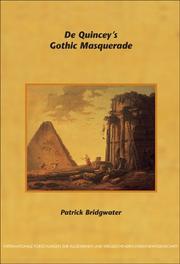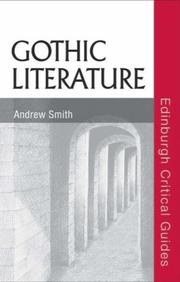| Listing 1 - 10 of 30 | << page >> |
Sort by
|

ISBN: 9042018135 9401202117 1417591153 9781417591152 9789042018136 9789401202114 Year: 2004 Volume: 80 Publisher: Amsterdam ; New York Rodopi
Abstract | Keywords | Export | Availability | Bookmark
 Loading...
Loading...Choose an application
- Reference Manager
- EndNote
- RefWorks (Direct export to RefWorks)
De Quincey's Gothic Masquerade is what has long been needed, a study of Thomas De Quincey's Gothic and Gothic-related texts by a Germanist working on Gothic and specializing in Anglo-German literary relations. Variously identified as Gothic Hero, Gothic Parasite, and author of a Gothick sport, De Quincey is the dark horse of Gothicism, for while his work has, increasingly, been associated with Gothic, not one of the recent companions to Gothic so much as mentions his name. Definitions of what is meant by 'Gothic' have changed, of course, and are still evolving, claiming more territory all the time, but Gothic specialists also have their blind spots, of whom De Quincey is one. One reason for this state of affairs will be the fact that in his work the Gothic is interwoven with the German, to which modern English studies all too often turn a blind eye. In this timely study of his work in relation to Gothic convention the author addresses the question of De Quincey's reputed knowledge of German 'Gothic' Romantic literature and the related question of supposed German influences on his Gothic work, and shows that his fiction is not less but more original than has been thought. The texts examined are those on which, for better or worse, his reputation as a writer both of autobiography and of fiction depends. Focusing on the Gothic takes one to the heart of his literary masquerade, and more especially to the heart of his masked autobiographical enterprise. Gothic, because of its formulaic nature, represents a place where he belongs, a place where his sense of guilt can be seen as part of a wider pattern, thus countering his pariah self-image and enabling him to make some sort of sense of the Gothic ruin of his life. Addressed to all who are interested in De Quincey's work and its place in literary history, and to the many readers in the English and German-speaking worlds who share De Quincey's and the author's enthusiasm for Gothic, this book adds considerably to the scope of De Quincey studies, which it enables to move on from some of the main unanswered questions of the past.
Quincey, de, Thomas --- Gothic literature --- Gothic literature. --- European literature
Book
ISBN: 184888088X 900440354X Year: 2012 Publisher: Oxford, England : Inter-Disciplinary Press,
Abstract | Keywords | Export | Availability | Bookmark
 Loading...
Loading...Choose an application
- Reference Manager
- EndNote
- RefWorks (Direct export to RefWorks)
Gothic literature --- Gothic literature. --- Tales. --- History and criticism.
Book
Year: 1966 Publisher: Stuttgart : Metzler,
Abstract | Keywords | Export | Availability | Bookmark
 Loading...
Loading...Choose an application
- Reference Manager
- EndNote
- RefWorks (Direct export to RefWorks)
Book
ISBN: 1299200494 070832262X Year: 2009 Publisher: Cardiff : University of Wales Press,
Abstract | Keywords | Export | Availability | Bookmark
 Loading...
Loading...Choose an application
- Reference Manager
- EndNote
- RefWorks (Direct export to RefWorks)
This book explores the paradox that the Gothic (today's werewolves, vampires, and horror movies) owe their origins (and their legitimacy) to eighteenth-century interpretations of Shakespeare. As Shakespeare was being established as the supreme British writer throughout the century, he was cited as justification for early Gothic writers' fascination with the supernatural, their abandoning of literary "decorum," and their fascination with otherness and extremes of every kind. This book addresses the gap for an up to date analysis of Shakespeare's relation to the Gothic. An authority on the Gothi
Gothic literature --- History and criticism. --- Shakespeare, William, --- Criticism and interpretation.

ISBN: 1281089230 1780343515 9786611089238 0748630155 9780748630158 9780748623709 0748623701 9780748623693 0748623698 9781281089236 9781780343518 6611089233 Year: 2007 Publisher: Edinburgh : Edinburgh University Press,
Abstract | Keywords | Export | Availability | Bookmark
 Loading...
Loading...Choose an application
- Reference Manager
- EndNote
- RefWorks (Direct export to RefWorks)
A study that provides a grounding in both the history of Gothic literature and the way in which Gothic texts have been critically read. This book opens with a chronology and an introduction to the principal texts and key critical terms, and ends with a conclusion outlining possible future developments within scholarship on the Gothic.
Gothic literature --- European literature --- History and criticism. --- LITTERATURE D'EPOUVANTE --- HISTOIRE ET CRITIQUE
Multi
ISBN: 9783030845629 9783030845636 9783030845643 9783030845612 Year: 2021 Publisher: Cham Springer International Publishing, Imprint: Palgrave Macmillan
Abstract | Keywords | Export | Availability | Bookmark
 Loading...
Loading...Choose an application
- Reference Manager
- EndNote
- RefWorks (Direct export to RefWorks)
This handbook provides a comprehensive overview of research on the Gothic Revival. The Gothic Revival was based on emotion rather than reason and when Horace Walpole created Strawberry Hill House, a gleaming white castle on the banks of the Thames, he had to create new words to describe the experience of gothic lifestyle. Nevertheless, Walpole's house produced nightmares and his book The Castle of Otranto was the first truly gothic novel, with supernatural, sensational and Shakespearean elements challenging the emergent fiction of social relationships. The novel's themes of violence, tragedy, death, imprisonment, castle battlements, dungeons, fair maidens, secrets, ghosts and prophecies led to a new genre encompassing prose, theatre, poetry and painting, whilst opening up a whole world of imagination for entrepreneurial female writers such as Mary Shelley, Joanna Baillie and Ann Radcliffe, whose immensely popular books led to the intense inner landscapes of the Bronte sisters. Matthew Lewis's The Monk created a new gothic: atheistic, decadent, perverse, necrophilic and hellish. The social upheaval of the French Revolution and the emergence of the Romantic movement with its more intense (and often) atheistic self-absorption led the gothic into darker corners of human experience with a greater emphasis on the inner life, hallucination, delusion, drug addiction, mental instability, perversion and death and the emerging science of psychology. The intensity of the German experience led to an emphasis on doubles and schizophrenic behaviour, ghosts, spirits, mesmerism, the occult and hell. This volume charts the origins of this major shift in social perceptions and completes a trilogy of Palgrave Handbooks on the Gothic--combined they provide an exhaustive survey of current research in Gothic studies, a go-to for students and researchers alike.
Sociology of culture --- Film --- Gothic --- film --- Gothic fiction (Literary genre) --- Gothic literature. --- Gothic revival (Art) --- History.
Book
Year: 1966 Volume: 48 Publisher: Stuttgart : Metzler,
Abstract | Keywords | Export | Availability | Bookmark
 Loading...
Loading...Choose an application
- Reference Manager
- EndNote
- RefWorks (Direct export to RefWorks)
Gothic literature --- Littérature gothique --- History and criticism. --- Histoire et critique
Book
Year: 1966 Volume: 97 Publisher: Gent : Secretariaat van Vlaamse Academie voor Taal- en Letterkuunde,
Abstract | Keywords | Export | Availability | Bookmark
 Loading...
Loading...Choose an application
- Reference Manager
- EndNote
- RefWorks (Direct export to RefWorks)
Gothic language --- Gothic literature --- Writing, Gothic --- Gothique (Langue) --- Littérature gothique --- Ecriture gothique
Book
ISBN: 9780500252512 0500252513 9780691229164 0691229163 Year: 2021 Publisher: London Thames and Hudson
Abstract | Keywords | Export | Availability | Bookmark
 Loading...
Loading...Choose an application
- Reference Manager
- EndNote
- RefWorks (Direct export to RefWorks)
A richly illustrated history of the Gothic across a wide range of media, including architecture, literature, and film
Art, Gothic --- Architecture, Greek --- Gothic literature --- Horror films --- History --- History and criticism
Periodical
Abstract | Keywords | Export | Availability | Bookmark
 Loading...
Loading...Choose an application
- Reference Manager
- EndNote
- RefWorks (Direct export to RefWorks)
Irish literature --- Gothic literature --- Supernatural in literature --- Fantasy literature, Irish --- Littérature irlandaise --- Littérature gothique --- Surnaturel dans la littérature --- Fantasy literature, Irish. --- Gothic literature. --- Irish literature. --- Supernatural in literature. --- History and criticism --- Histoire et critique --- Ireland.
| Listing 1 - 10 of 30 | << page >> |
Sort by
|

 Search
Search Feedback
Feedback About UniCat
About UniCat  Help
Help News
News